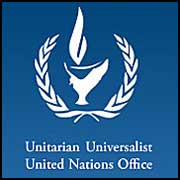UU United Nations Office to rejoin UUA
Move will give UN office, UUA greater advocacy strength.
The Unitarian Universalist Association announced on January 26 that the Unitarian Universalist United Nations Office, which has operated as an independent organization since 1971, plans to rejoin the UUA later this year.
The UU-UNO advocates at the UN on issues important to UUs, such as equal rights for lesbian, gay, bisexual, and transgender people; peacemaking; international rights for women and children; and climate change. The move to become part of the UUA cannot become official until the UU-UNO’s current membership votes on it, at the end of April.
Having the office under the UUA’s umbrella would prove advantageous, according to UUA President Peter Morales. “The big moral issues of our time tend to cross national borders, whether it’s about climate change, LGBT rights, such as in Uganda, or immigration,” he said. “To put these issues in an international perspective is appropriate and really the only reasonable way to approach it.”
Morales added that having the UU-UNO be a part of the UUA would lend the office a greater moral legitimacy while also giving the UUA an appropriate venue to speak out on a number of issues.
Bruce F. Knotts, executive director of the UU-UNO, agrees. “There are about 400 faith-based organizations at the UN, and to the best of my knowledge, we are the only one not tied to the central church authority. It’s quite appropriate for us to be tied to the UUA so we can legitimately go into the UN and say we represent Unitarian Universalists.”
If the UU-UNO membership approves the move, the UU-UNO will become part of the UUA’s Office of International Resources, headed by the Rev. Eric Cherry, on July 1.
“We consider this a homecoming,” Knotts said, “and we believe that the membership will vote overwhelmingly on April 30 to support this.”
The UU-UNO will continue to do its own fundraising, seeking donations from individuals and congregations, and applying for grants. UUA Treasurer and Chief Financial Officer Tim Brennan said that there are other programs and activities, such as Beacon Press and the Standing on the Side of Love anti-oppression campaign, that are self-funded parts of the UUA. He said that incorporating the UU-UNO should have no effect on the UUA’s operating budget.
Knotts said that the UUA’s administrative support would prove an asset. “I feel that our fundraising efforts will be enhanced by having access to the UUA’s Stewardship and Development department and the UUA’s communications network, so we can spread the good news of the great work we’re doing at the UN. One of the greatest obstacles I have as director is that most UUs don’t know we have an office at the UN and what we do here.”
At present, the UU-UNO is considered an associate member of the UUA. According to UUA Executive Vice President Kay Montgomery, no bylaws will need to be changed in order for the UU-UNO to join the UUA.
The UU-UNO office was founded in 1962 at the urging of U.S. Ambassador to the United Nations Adlai Stevenson, a Unitarian. In a letter to UUA President Dana Greeley, he wrote, “In this disastrous and shrinking world it is no longer possible—if it ever was—for local communities to be more secure than the surrounding world. Our ultimate security therefore lies in making the world more and more into a community.”The UU-UNO was part of the UUA until 1971, when it opted to become a voluntary organization supported by voluntary contributions during a time of major financial cutbacks during UUA President Robert West’s term.
The UU-UNO is classified as a non-governmental organization with consultative status in the UN’s Department of Public Information. The UUA has consultative status in the Economic Social and Cultural Committee, and the UU-UNO has always acted on the UUA’s behalf in this function. In addition, the UU-UNO serves on the NGO Human Rights Committee, the Committee on Sustainable Development, and the NGO UNICEF committee, and in ad hoc groups, including the Faith and Ethics Network for the International Criminal Court, the Gender Based Violence Sudan group, and a faith-based consortium that it has organized in collaboration with the Gay and Lesbian Alliance Against Defamation and others.
Along with the UUA, it is sponsoring a special fund designed to help human rights activists in Uganda counter homophobia. The UU-UNO was also one of the main organizers of a December 2010 conference that brought leading human rights advocates from Uganda and Kenya to discuss support for LGBT groups fighting homophobia in East Africa.
The UU-UNO membership consists of congregations and individuals. Congregations are urged to select a UU-UNO envoy to serve as a liaison between the congregation and the UU-UNO. The envoy is charged with promoting UU-UNO activities and membership, organizing an annual UN Sunday service, and holding internationally themed events and fundraisers. The UU-UNO also offers an annual intergenerational spring seminar on a topic of international importance. This year’s seminar, which will be held April 28–30, is called Empower Women for a Better World.
Knotts sees the joining of the UUA and the UU-UNO as a new opportunity for representing Unitarians and Unitarian Universalists around the world. The UU-UNO already has a relationship with the Canadian Unitarian Council. (The CUC voted to become independent from the UUA in 2001.) “I see no reason why we shouldn’t be representing Unitarians and Unitarian Universalists worldwide,” he said.
See sidebar for links to related resources.
Comments powered by Disqus







